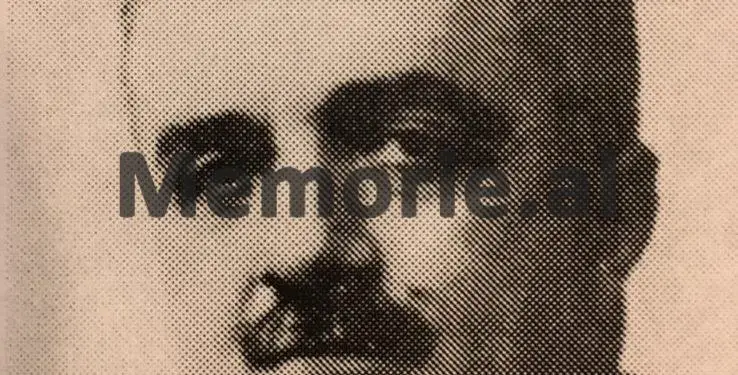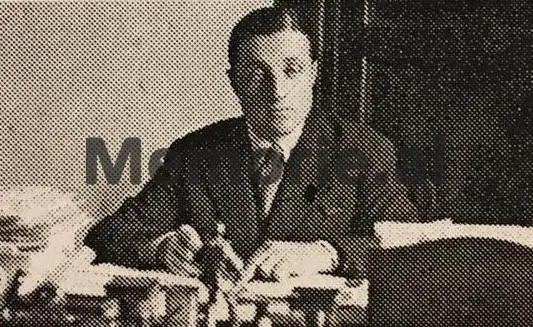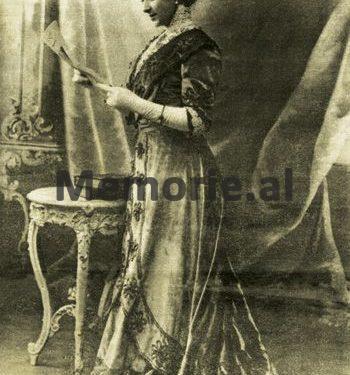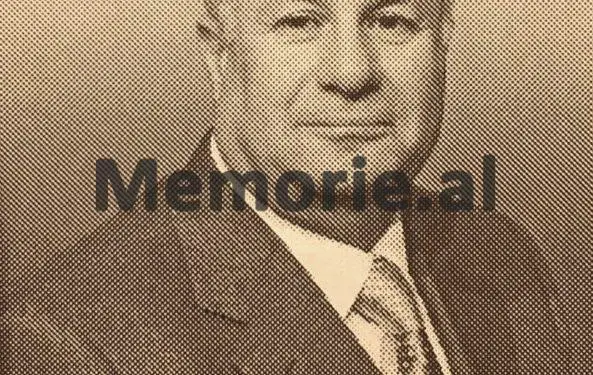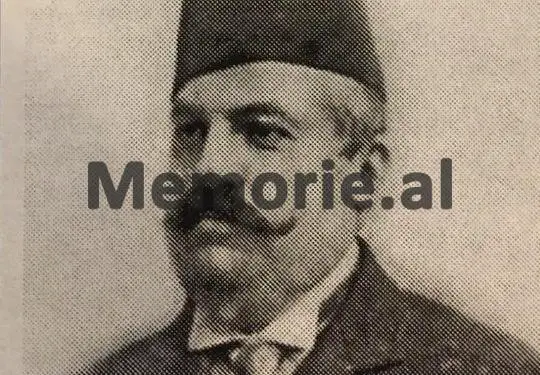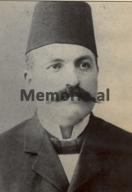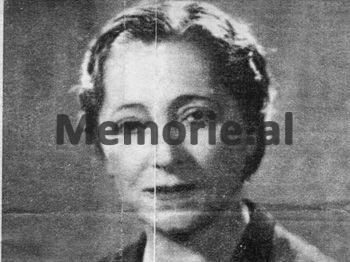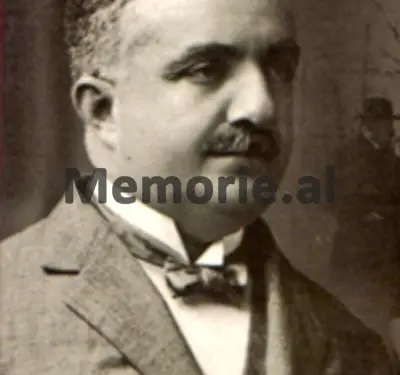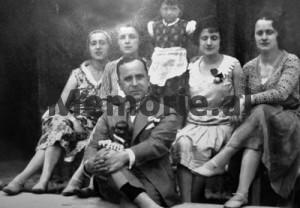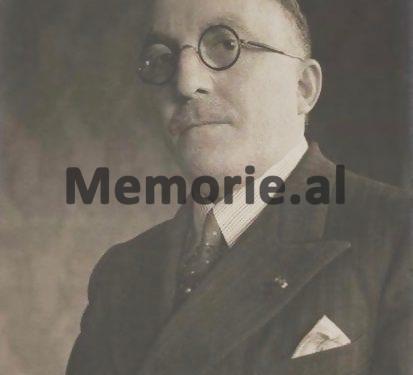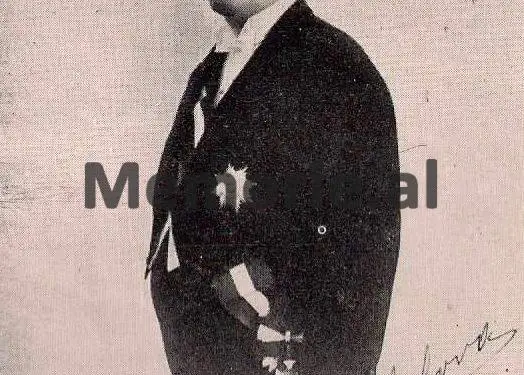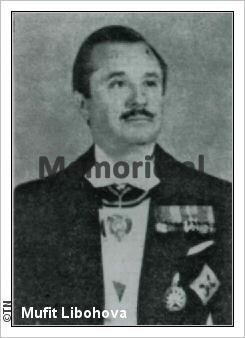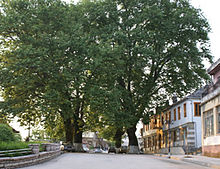Dashnor Kaloçi
Memorie.al publishes the unknown story of one of the great and well-known aristocratic families in the entire history of Albania, or as it is otherwise known, the family of “Asllan Pashëllinjve”, who had ruled Ioannina for 200 years and its suckers were educated graduated from the most prestigious universities in Europe, to then take high positions and functions as prefects, mayors or ministers in the period of the Zog Monarchy, such as: Mufid bey Libohova, Servet bey Libohova, Ekrem bey Libohova, Maliq bey Libohova, Asaf bej Libohova, Dr. Shefqet bej Libohoha, Ihsan bej Libohova, Ajet bej Libohova, Enver bej Libohova, Neki bej Libohova, as well as two twin brothers: Kapllan and Arsllan Libohova. Servet Libohova’s testimony of how they were barbarically persecuted by the communist regime of Enver Hoxha, who after seizing the villas and all the property they had invested since the period of the Ottoman Empire, imprisoned them and imprisoned them until 1990. -të.
My father Ihsan Libohova, who had finished primary and unique school in Istanbul and Corfu, graduated in Law and Political Science at the Sorbonne and Rome, when he returned to Albania he ran the newspaper “Tirana” and during the years of the Zog Monarchy he served for many years as prefect of the first class in Pogradec. After that, for the good work he had done in Pogradec, Zogu brought him to the Ministry of Interior in Tirana, appointing him as General Director for Municipalities and Communes in that department. Although after the fascist occupation of the country, my father refused to serve again in the state administration, but was locked up at home only to study, in November 1944, he was arrested by partisan forces which also expelled us from the house by seizing all the villa where the residence of the Macedonian embassy is today “.
This is how he remembered the story of his father, Servet Libohova, one of the descendants of the large Libohova family, which is known and considered as one of the oldest and richest families in the entire history of Albania. What is the past and origin of the Libohova family, what was the social and political position that that family had from 1403 when it was first known until the second half of the last century? Who were the most prominent men that that family produced, what functions and positions did they hold during the period of the Ottoman Empire and then with the creation of the new Albanian state? What was its socio-political stance during the period of the Zog Monarchy and why did the communist regime of Enver Hoxha most barbarically persecute this well-known family, shooting, imprisoning and deporting its descendants until 1990?
Who was Ihsan Libohova?
After Mufid bej Libohova who was one of the most famous suckers of the Libohova family, or as the family of “Asllan Pashëllinjve” is otherwise known, from that famous door came many other wise men who were educated and graduated from the most prestigious universities of the East and the West, who then returned to Albania giving their contribution to all the functions and duties assigned to them in the senior administration of the Albanian state since the first government of Ismail Qemali, as well as during the years of the Bird Monarchy. Among those descendants of that family, after Mufid bej Libohova, are also known Servet bej Libohova, Ekrem bej Libohova, Maliq bej Libohova, Asaf bej Libohova, Dr. Shefqet bej Libohoha, Ihsan bej Libohova, Ajet bej Libohova, Enver bej Libohova, Neki bej Libohova, as well as two twin brothers: Kapllan and Arsllan Libohova. Regarding the life, schooling and career of one of the suckers of this famous tribe, named Ihsan Libohova, who during the years of the Zog Monarchy served in the senior administration of the Albanian state, his son, Servet Libohova, a few years ago testified to us: “My father, Ihsani, was born in 1901 in the small town of Libohova, where our family comes from. He received his first elementary school education in the city of Gallatasaray in Turkey and then attended high school at the French Gymnasium in Corfu. After graduating from high school with excellent results, Ihsani was sent to pursue higher studies in France, where he graduated with honors in Jurisprudence at the Faculty of Law at the Sorbonne University. After graduation, Ihsan was offered to work as a lecturer at that university, but he refused and returned to Albania. Ihsani did not stay in Albania for more than a year, after fleeing back to Italy, where for four years he studied at the Faculty of Political Science at the University of Rome. After that, around 1930, the father returned to Albania after defending two doctorates and was fluent in several foreign languages. While his father was studying political science at the Sorbonne University in France, he had a close friendship with the famous French intellectual Daladier, who was later elected to the post of Prime Minister of France for several consecutive terms. After returning to Albania in the mid-1930s, the imam, Ihsan Libohova, who had twice defended his doctorates at the Sorbonne and Rome, settled in Tirana, where he opened an independent newspaper entitled “Gazeta”. of Tirana “, recalled Servet Libohova, regarding his father, Ihsan, who in the late ’20s, graduated from the universities of Sorbonne and Rome.
Libohovites graduated in Italy
In addition to Ihsan Libohova, his three brothers: Enver, Asafi and Shefqeti, also graduated from Western universities. Regarding this and their professional career in the following years, Servet Libohova told us: “Like my father, his three brothers studied and graduated from Italian universities. Enver graduated in Agronomy at the University of Bologna, while his other uncle, Asafi, graduated in Jurisprudence at the University of Rome. Similarly, the other uncle, Shefqeti, graduated and received a doctorate in Law from the University of Rome and then when he came to Albania, he practiced law. Of my three uncles, who graduated in Italy, only Asafi did not return to Albania after graduation, as he stayed in Rome, where he lived until his death in the 1960s. Unlike his three brothers who dealt with law and agronomy, my father, Ihsani, continued his career working in the senior administration of the Albanian state. Thus, after some time that his father worked in the management of the newspaper “Gazeta e Tiranës”, he was called by King Zog and was appointed to the position of deputy prefect of Pogradec. After four years in Pogradec, in that position where Ihsani left a good name, King Zog called him back to Tirana and appointed him Director of Municipalities and Communes at the Ministry of Interior. In that position, the father served for many years and in 1937, he married our mother, Fazilet Vërlac, the daughter of the well-known politician and MP, Shefqet Vërlaci, who in the early 1940s, accepted and exercised the function of Prime Minister of Albania. After the occupation of Albania by Italy, the father refused to serve in the administration of the Albanian state of that time. Thus, during the entire period of the fascist occupation of the country, Ihsani did not deal with any state work, but was locked in his house, dealing only with studies. During those years, our family moved in and lived in the new villa (where today is the residence of the Macedonian Embassy), which my father and mother had started building there at the end of 1937, after buying the land. “For the construction of that villa they spent their savings from the property they had inherited from their parents, as well as the financial inheritance of our grandmother, Qanie Libohova (Toptani)”, recalled Servet Libohova, regarding the career of his father Ihsan, during the years of the Monarchy of Zog, as well as the three uncles who had graduated in Italy.
Ihsan’s sentence in the Special Court
But what was the fate of Ihsan Libohova, his family and his brothers, after the end of the war and the coming of the communists to power? In this regard, Servet Libohova said: “In November 1944, when the war was not over, the villas where our family lived at that time, were all surrounded by numerous partisan forces. After that, 17 of them, armed with automatic weapons, came in loudly, scaring us small children. At that time there were, father, mother, as well as me with two sisters: Seresi and Vesta, who were slightly older than me. The partisans just got inside, arrested my father and we were immediately taken out of the house with only body clothes, telling us to go wherever we wanted. After seizing the entire large house with all the furniture and belongings inside, my mother and two sisters and I were left in the middle of four streets, not knowing where to go. We were only able to get some loot out of the house and this only became possible after we paid one of the partisans who had the rank of captain, who was in charge of guarding the house. At the time we were evicted, our large villa was given to the President of Albania, Omer Nishani, and his noble wife, who was of Austrian descent, often telling the people who served there: ‘Beware, keep this house because it is the loan and one day its owner will come again to take it ‘. While my father was in Tirana prison, we opened the door and were sheltered by the well-known Tirana family Tufina, who were very generous with us and did not want to know at all that the communists had described us as a reactionary family. While my father appeared in the Special Court and was sentenced to ten years in prison, we as a family stayed in Tufinat, until 1956, when we were removed from Tirana. The father served his sentence in the terrible camps of the Maliqi Swamp and in Beden of Kavaja, he was released from there only in 1950, taking advantage of some amnesties that were given at that time to political prisoners. During the time he was in prison, the father became seriously ill and was able to escape death, only in her of Dr. Zymës, who took over his operation. After being released from prison, my father worked as a shovel worker, making mortar in the construction company “Muhamet Gjollesha”, where he was paid very little and during all those years we remained in a miserable economic situation. At that time, we were living on the little income we had left without being seized and by selling those little things we could have gotten out of the house in 1944 when we were seized. The revenge of the communists did not end only with our family, but they continued the attacks on my father’s brothers, as well as many other families of the Libohova tribe. So, after my father was convicted, in 1946, the communists arrested my uncle, Dr. Shefqet Libohova, who graduated in Law in Rome. Although Shefqeti was wounded during the Anti-Fascist Youth demonstrations during the War, he was accused of “attempting to escape” and was sentenced first to death and then to 101 years in prison. Shefqet died in Burrell Prison and left no children, as he had not started a family. Prior to Shefqet’s arrest, the communists had also executed his father’s first cousin, Xhevat Libohova, who had graduated from the Military Academy in Italy. Also, in those years, our other cousin, Elmaz Myfid Libohova, was arrested and convicted, who had graduated from the Lyceum of Korça and when he was studying there, his father had left him under the care of Enver Hoxha. “Elmazi and his whole family lived in exile in the village of Tresh in Lezha until recently, and when he died, only I and my father, Ihsan, buried him,” recalled Servet Libohova, regarding the sentencing of his father, Ihsan, as well as the persecution of many other families of the Libohova tribe.
Serveti: How did the families from Shkodra help us?
Around 1956, the Libohova family was removed from Tirana and interned in the city of Shkodra. Regarding this and the stay of that family in that city, Servet Libohova said: “With the help of our family friend, Hamit Tafilica, we were able to settle in the city of Shkodra, settling in a house for rent on Luigj Street Gurakuqi”. At that time, we could hardly arrange to go to the city of Shkodra, as that city was much coveted by the exiled families, being considered a paradise, compared to other cities in Albania, where they sent the “reactionary” families exiled. During the time we went to the city of Shkodra, our family remained very poorly from the economic situation and as a start we could live by providing only the bread of the mouth, thanks to our mother’s work, who sewed glass for the mountain families. Those glasses that my mother sewed, went out and sold to the lady of the house where we lived, but again our economic situation remained quite difficult. After that, the father could hardly start work, paving the roads with stones and then as a loader, loading and unloading gravel trucks in Zall e Kirit. In that job, Imata worked until 1963, when he reached retirement age, but the pension guaranteed by law was never given to him, leaving him with no income. Likewise, any financial assistance in dollars, which came to us at that time from the family of our mother (Vërlaci) who lived in Italy, the state broke us with a very small exchange rate. But during all those 35 years that our family lived in the city of Shkodra, there was a great moral help from many families in Shkodra, such as that of Uran Anamal, Hamza Dervishi, Rauf Changa, Pjerin Prek Deda (known as Axha), Flamur Selmani, Eduart Përjakut, Njazi Mukës, Leopol Shkreli, Malo Dervishi, Xhevat Hajdari, etc. After being released from prison, the father isolated himself at home and there came and visited some of his closest friends, such as: Dom Injac Dema, Hamit Tafilica and professor of mathematics, Muhamet Hoxha, who had graduated in France. “These three well-known intellectuals, whom my father considered to be wonderful people, never parted ways with Ihsan and were found in his most difficult days,” concluded Servet Libohova, the sucker of one of the oldest families and most famous in the entire history of Albania, which was persecuted in the most barbaric way by the communist regime of Enver Hoxha. Like his entire tribe, Servet Libohova, during the years of internment in the city of Shkodra, was able to work only as a porter at the Saw Station, or as it is otherwise known by the people of Shkodra as the “Shaljani Factory”.
Olga, the Albanian Dane
Madame Olga was born in 1886 in Denmark. Her father was in the military and during the war with the white Russians, he was forced to flee, choosing Paris as his new residence. Olga, as a young and art-loving girl, chose to study piano and her father sent her to Istanbul. Thus, Turkey became the cause of Mufid bey Libohova’s acquaintance with the student, a love which brought the Danish Olga to Albania. “It was the end of 1908 and the beginning of 1909 when my grandfather and grandmother arrived in Albania. “Since then, Madame Olga has not left her husband’s place,” said Mufid Libohova (the young man). The former Interior Minister had a son with his first wife, Malik, while with Olga, he had another son, named Elmas. Unfortunately, the story between the bey from Libohova and the Danish Olga, closed quickly. In 1927, Mufid bey Libohova passed away, but this did not separate Olga from the place where she lived for many years with her husband, Albania. “Mrs. Olga took the reins of the house, whom we all loved, not as Mufid’s wife, but as members of our village,” an old resident of Libohova told us.
How did he save 100 men from being shot?!
In early 1944, when the Germans controlled almost all areas of the country, Libohova was guarded by only two guards. Knowing the German language, Olga Schweizer entered into talks with the Germans, convincing them that the village of Libohova where they lived had nothing to do with the partisans. Until May of that year, Libohova remained an untouched island. During that time, the villagers also kept some partisans with bread, but secretly. Libohova was also affected in the June Operation, after someone spied on a wounded partisan in the village. After a surprise search of the reported home, he was found. The next day Libohova was filled with soldiers, who took all the families to the big plane tree in the center of the village. The German captain, after presenting the reason for their presence in the village, ordered the squadron to shoot 100 men. “Even today, the oldest men in Libohova tell us how my grandmother, Mrs. Olga, entered among the 100 men who would be shot and the squadron, threatening the officer that: if he were to kill the men, he would first “he had to shoot at him,” says Mufidi (the young man), proudly expressing his grandmother’s action. As a result of the Danish intervention, 100 men escaped, while the punishment given by the Germans was the burning of the village. After the end of the War, exactly in 1945, by order of Petrit Duma, the family of Mufid Libohova, had to move to a cow stable, where they stayed for 5 consecutive months. “Then the most important books of the grandfather were taken, while they forced the women of Libohova to take out the bins of clothes in the main square and make the fire with our books. “Our library had 2,500 volumes, as well as important historical documents from the time of relations with Turkey,” recalls Mufid Libohova of that difficult period of his family.
The long persecution of the Libohovite beys
After living for 5 months in a cow stable, Olga was interned in Shijak. Abandoned by family members and separated from the boy who was in prison (while the eldest son, Kemal, was a consul in Bari), the Dane worked in the corn fields. Olga’s son with Mufid, Elmasi, returned from Italy in ’45, where he studied, hoping to improve the situation. While being housed in one of the busiest hotels in the capital and familiar with the situation in the country, he was arrested on three charges: “attempted escape, agitation and propaganda and a hostile group”, sentenced to 11 years in prison.
From 1949 to 1958 for almost a decade, Olga lived in exile in the village of Tresh in Lezha. After her son was released from prison, the Dane lived with him in the village for some time. In December of this year she died at the age of 77 and was buried in the village of Zejmen in the same district. Her son, Elmasi, also died in hard work in 1977. At that time, his wife was in the Lezha investigator. About this event, the young Mufidi recalls: “My father worked in the field with blood pressure 28. In addition to his illness, my father was shocked by the fact that my mother was taken to the investigator, who was sentenced to 5 years in prison, being accused of saying, that: I once had 30 sheep! “And that was not true at all, because our family was not in the habit of telling what was going on, and all this because they all knew us very well.”
From Elmas’ marriage three sons were born: Enver, Kemal and Mufidi (the young). The persecution continued until the grandchildren of the former Minister of Interior, Mufid bej Libohova, who later took over the post of Minister of Foreign Affairs and Finance. Mufidi, (the young man), indicated that from 1985 to 1987, he was banned twice. “In 1990, it reached its culmination, after I was arrested by Zef Loka and for a month I was followed. I did not know what would happen to me, I only heard that they had it with us, with that layer which was a problem for the government at that time. I do not know how I escaped from that “dance of death”, said the young Mufidi.
Olga Libohova and her son, Elmasi, rest in the gentle hills of Tufina and that only became possible in 2001 when the remains of a mother and son were pulled from Zejmeni in Lezha. Already their grave is surrounded by a low fence and this only out of grief! Mufidi tells us that their family never wanted to surround the grave, as they have been breathing inside the barbed wire all their lives, but this made the cows and cattle no longer destroy the tombs of Olga and Elmas. “At least they should rest in peace after so many years,” he said. This is the short-written story of the family of Mufid Libohova, the former Minister of Interior of Ismail Qemali, and his family, amidst the suffering, problems and persecution of the communist regime of Enver Hoxha, who followed them even after his death. /Memorie. al




